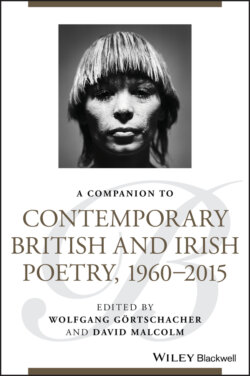Читать книгу A Companion to Contemporary British and Irish Poetry, 1960 - 2015 - Группа авторов - Страница 28
Val Warner, “England, Our England” (From Tooting Idyll [1998]) (Warner 1998, 37)
ОглавлениеThe poem is made up of the address of a homosexual lover to his partner, in which he reflects on and faces up to the outbreak of war in 1939. The title, seemingly propagandistic, is not, in fact, so. The speaker's and his partner's England is a gay one, criminalized, despised. It mutates sadly into a homophobic “England, their England” in line 12.
The organization of the subject matter is complex. In lines 1–4, the speaker wishes simply to live and die in the moment. Lines 4–7 offer the addressee's vision of appropriate conduct: to make a last stand in hell's mouth. Lines 8–10 offer a conditional “If,” in which no one goes to war. In lines 10–12, England is seen as a garden facing destruction, but in lines 12–14, this England is seen, correctly, as a place that imprisons homosexuals. Lines 14–17 offer at best a limited resolution: the addressee will side with the “workers,” who spit at gay men.
The poem presents movements of thought and feeling, which interweave. Different subjects melt into each other in the same line. There is much enjambment. Stanza length is irregular. One has a clear sense of a mind coping with personal, historical, and national complexities.
This sense of a mind speaking to itself is marked in the informal lexis and syntax (see ll. 1–2; note the recurrent ellipsis points, as the speaker pauses). This sense is augmented by a lack of rhyme, although all lines but line 4 have 10 syllables and four or five main stresses. Stanzas, too, are of irregular lengths, thus suggesting natural, formally unconstrained reflection. There are patterns of alliteration, to be sure (/h/ in lines 1 and 2, /l/ in lines 13–16), but these are local, and suggest intensity rather than technical shaping. One striking feature of the poem, which surely bears semantic weight, is the presence of compound lexis: “live‐long,” “mayfly‐like” (which is doubly compounded), “blue‐sky,” “last‐stand,” “wheelchair,” “twilight,” “speedwell,” and “birthright.” Here, the whole subject of the poem—are we together, are we together with the country that disowns us?—is foregrounded. Various kinds of history (national, personal, sexually oriented) come together in a carefully realized enactment of uncertainty.
